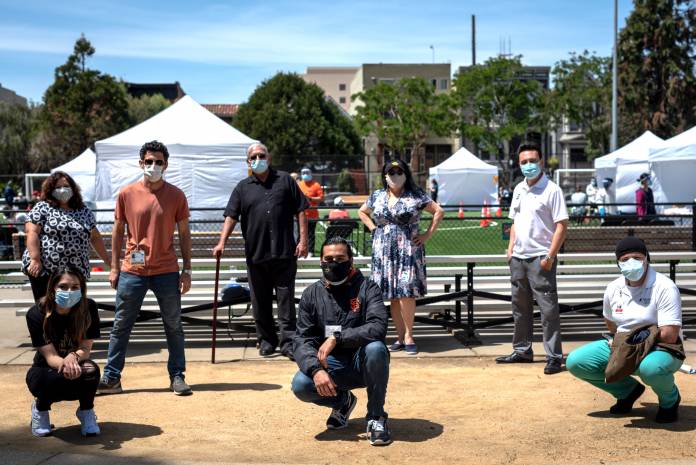
Numbers matter.
Inequity, by definition, means a lack of fairness or justice. Inequity in practice means 84% of the hospital beds in San Francisco General Hospital for COVID-19 are taken by Latinos, despite making up only 15% of San Francisco’s population.
The research study done through our work with the Latino Task Force on COVID-19, in partnership with UCSF and powered 100% by community-led volunteering, further compounds this inequity: Seven weeks after shelter in place, 95% of those who recently tested positive in last week’s massive testing of nearly 3000 residents within a one-mile radius of the Mission District were Latino. It proves the point that we knew to be true, sheltering in place works for some, but not all, as 90% of those who tested positive said they could not afford to stay at home due to their work.
The higher number of infections could seem like an abnormality to some if almost identical trends weren’t afflicting Latinos across the country. We see the same trends surface in the Bronx NY, and countless other urban areas. I must also state that these disproportional outcomes with COVID-19 mirror starkly in our Black, API and Indigenous neighboring communities across America.
When we look closer, we better understand the connection to higher rates of infection and higher rates of mortality to COVID-19 because we see that our collective communities are the remanence of subjugation through slavery, colonization, exclusion, segregation, redlining, and gentrification. The structures of power intentionally, and unintentionally, have ensured a legacy that survives off of a disproportionate lack of investment, attention, care, and representation for all things within our communities persisting, with the exception of policing.
The results of this history are in the numbers above. We are economically insecure and have some of the lowest amounts of accumulated wealth compared to our white counterparts. The lack of economic power and persistence of economic inequality contributes, by and large, to the type of essential work our families do. It contributes to the pulling from multiple resources to secure housing, which as we see, amounts to crowded multigenerational homes. And thus contributing directly to the linkage between our communities and their unfortunate connection to COVID-19.
The circumstances we inherited lend themselves to the unequal outcomes we witness.
What the numbers behind these results should do is adjust the lens by which we view the problem. We should understand that the disproportionate impact on communities of color, and for this study the Latino community, only magnifies deeply ingrained issues that have long existed. We should realize that to fix them we must strike at the heart of the issue: Inequity.
What this must also do is ensure that all of our elected leaders take this information and shift policy and resources to help disrupt the transmission of the virus, and the transmission of the inequities that enhance our problems to begin with. Action is desperately needed, the numbers don’t lie.
Jon Jacobo with the Latino Task Force on Covid-19 serves as the Chair of the UCSF Study Committee, and is the elected Vice President for the Calle 24 Latino Cultural District.

